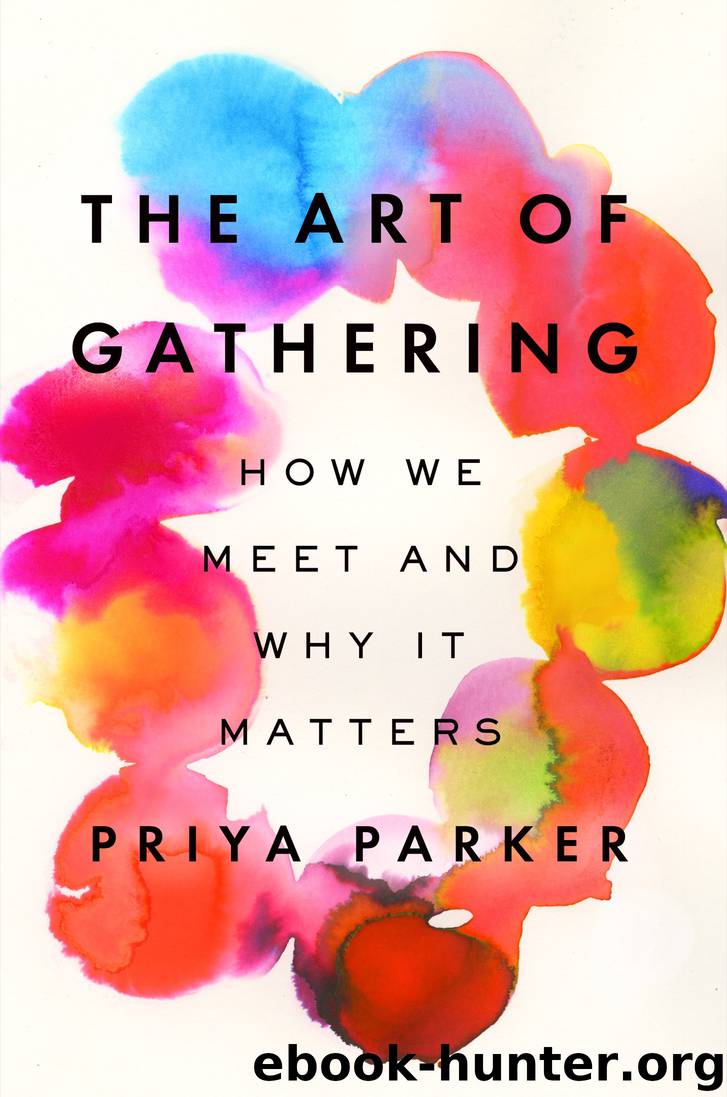The Art of Gathering by Priya Parker

Author:Priya Parker
Language: eng
Format: epub
Publisher: Penguin Publishing Group
Published: 2018-05-15T04:00:00+00:00
A gathering is a social contract
Priming matters because a gathering is a social contract, and it is in the pregame window that this contract is drafted and implicitly agreed on.
Why is a gathering a social contract? Because it proceeds from an understanding between host and guest, sometimes stated and sometimes unstated, about what each is willing to offer to make it a success. Another way to say that is that all gatherings come with expectations. There are expectations of the host—that the agenda will be followed or that food will be served. There are expectations of the guests—that they will do their homework and come prepared with ideas; that they won’t bring their three cousins along; that they will dance their heart out and get others to do so. These expectations are present whenever people gather, and the prevailing understanding of what they are constitutes a gathering’s social contract.
As with purpose, it is often through conflict and disgruntlement that underlying assumptions about a gathering’s social contract reveal themselves. Once, during a conference in Aspen, some friends of mine came back from a dinner irritated because of a violation of what they took to be its social contract. What had been billed as a large but social dinner at someone’s home was, midway through the evening, transformed into a brainstorming session on the hosts’ work project. The dinner guests, many of them not experts in the industry or particularly interested in “working” at the end of a long day, were suddenly expected to be advisers. My friends, who were among these nonexpert guests, suddenly realized that the dinner invitation was the lure; now they were on the hook to help the hosts make business decisions. Even though the hosts were paying for the dinner, the guests felt used. You never want your guests to think, “Hey! I never signed up for this.”
A gathering’s social contract is often invisible to us, even when we are carrying out its commands. For example, you may not think that last dinner party you went to had a social contract, but did you bring a bottle of wine or a six-pack of beer or a dessert? If so, why? Because of the implicit social contract that sounds too crass to say out loud: They were making you dinner, and you were helping defray the cost of hosting. Similarly, the social contract of a networking event may be something like this: I am paying forty-five dollars to attend this event; in return, you will ensure that there are better people here than I would meet on my own at the local bar. A social contract for a gathering answers this question: What am I willing to give—physically, psychologically, financially, emotionally, and otherwise—in return for what I expect to receive?
Among the burdens of hosting is drafting this social contract, starting with that moment of discovery. First things first, the host has the chance to frame the event. This is where your specific, unique purpose comes into play. For
Download
This site does not store any files on its server. We only index and link to content provided by other sites. Please contact the content providers to delete copyright contents if any and email us, we'll remove relevant links or contents immediately.
The Compound Effect by Darren Hardy(8975)
Wonder by R.J. Palacio(8584)
Atomic Habits: Tiny Changes, Remarkable Results by James Clear(8349)
Becoming Supernatural by Dr. Joe Dispenza(8223)
Wonder by R. J. Palacio(8115)
Change Your Questions, Change Your Life by Marilee Adams(7786)
The Road Less Traveled by M. Scott Peck(7605)
Born to Run: by Christopher McDougall(7130)
Daring Greatly by Brene Brown(6518)
Big Magic: Creative Living Beyond Fear by Elizabeth Gilbert(5778)
Grit by Angela Duckworth(5617)
The Slight Edge by Jeff Olson(5420)
Men In Love by Nancy Friday(5246)
The Wisdom of Sundays by Oprah Winfrey(5165)
You Are a Badass at Making Money by Jen Sincero(4934)
Fear by Osho(4741)
The Miracle Morning by Hal Elrod(4732)
The Four Tendencies by Gretchen Rubin(4606)
Rising Strong by Brene Brown(4465)
